#as a highly empathetic people-pleaser this was so hard to write
Explore tagged Tumblr posts
Note
TW: T0rture/bl00d/murder/manipulati0n/weap0ns mentioned
Okayyyyy, so about my skills. I am good at combat, you just need to give me daggers, knives, swords or bow and arrow, I know how to fight with all of those weapons (of course I am also able to fight without weapons). Also I am good with guns (I used to be a sniper). I can drive very well (lost my license but who f***ing cares?) I can drift and drive fast without making an accident. Also I can be very scary (even without fear gas) just like you. I am very good at manipulation (of course I wouldn't manipulate you into doing anything, since I work for you). One of my other skills is people watching and understanding them. I have knowledge in Psychology, science, languages and history (just to say a few things I'm good at). Of course I can also be trusted with secrets not even torture will get me to say anything as long as you have plans to keep me involved in your business. And Riddler, I knew what I would get myself into, so Scarecrow doesn't have to sweet talk what he does. Scarecrow I have chosen to work with you (and maybe sometimes with Riddler, since I LOVE Riddles) since I see with have similar goals, also I love Horror, Halloween and just in general creepy stuff, all of that kinda fits you, doesn't it?
That enough or do you need other reasons why you should let me work for (/with?) you?
~Chucky
[tw: body horror]
Jonathan Crane | The Scarecrow
Mmh.
The Riddler and the Scarecrow look at each other, with a strangely knowing smirk you can't quite interpret.
You wanna...?
Edward Nygma | The Riddler
Oh no, please, go ahead.
A longer pause makes the room fall quiet. Then, finally, Jonathan takes a deep breath, stands up, and walks towards you.
Jonathan Crane | The Scarecrow
Listen, Chucky.
The room's atmosphere noticeably shifts.
Number one: I already have one person with the obsessive compulsive need to run their mouth working with me - I don't need another.
You notice Jon's accent has nearly all but faded, speaking in a slower, softer, and yet more menacing tone.
Number two: If you ever want to work for me or the Riddler, you might want to consider being less... cheeky.
And number three.
It is as if his breath itself was emitting fear. Come to think of it, he has been inhaling his own toxin like oxygen for years, injected it into his veins, even. The room itself seems to darken, as his flesh melts off his face, twisting and deforming, shifting into a horrifying grimace.
The Scarecrow
D̷̹̬͕̪͎̎O̸̥͕͖͕̔̾́ ̸͖̂̀̾̾ N̷̟̲̺̘͖͗̌͜͝O̸͉̤̅̂͘T̷̞̞̬̩͚̾̂ ̴̠͍͎̍̈́͘ͅ Ç̶̘̭̯̎̇̾̕Ǫ̸̒ͅM̶͗͛̉ͅP̶̛͇̥̰̹͚̌͛̃̎́̓Ă̴͉͖̥͈̥̎͑̚Ṟ̵̳͎̟̥̥͓͝Ë̵̞̜̦̻̳̬́ ̸̡̛̙̰̗͙̭́̒̎̌͜͝Y̷̼̜̮̪͇͌Ǒ̸̢̪͓̥͗̾͑̌͑U̷̢͇͚̭͇̱̭͋̊̾̔̄R̸̡͓̯̘̺̊̂̈́̍͆͜ͅS̴̘̯̣̓̌̽̌̈͂͘Ĕ̸͇̱̪͚̳̐̈̅L̵̘̔͌̅̄F̵̛̻͖͉̓̔ ̸̱͖͌͌́̕ T̷̨́͊̈́̓̌͠O̸̹̅͂̆̇ T̵̪̫̺̘̜̮̱̈́̒̓̕H̵̯͉̦̝̎̎́͌E̴̪͔̜̺̮͗͌̈́̐̆͘͠ ̴̜̙̼͔̟̄͊̐̄͌̕M̶͖̬̝̯̺̫̿Ȧ̸̠͚̠̜̈́͛̀̊̉S̸̢͌ͅT̷̡̧͍̝̳̜̲͒̅̓͑̑͋̈Ė̷͍̯̘̟͍̤̆͜R̸̲̗̤̙̪͊̕͜ ̴͂͜ Õ̸̯̗̠̹̖̖͎̏̊͋̚F̴̡̱̫̤̩̅͂͜ ̵̛̠̥͔̥̙̼̆͐͜ F̸̞̦̦͕͓͕͍̓́͊̃͆͝͝E̵͚͑̅̈̈́͘̕Ä̸̻̭́̀́̈̂́͗R̴̢̰̦̔̄̀̎͗̈́͘
Edward, who has been standing in the corner during Jon's monologue, has been grinning this entire time, watching in fascination. But even that last sentence sent a shiver down his spine.
Edward Nygma | The Riddler
Brr, still gets me every time.
The room seems to lighten up again, and a look at the former professor makes you question if all of this truly happened just now.
Jonathan Crane | The Scarecrow
Stick ta that an' yer hired.
His accent is back, and his face looks perfectly normal, well, normal by his standards. It feels as if you had just witnessed a nightmare whilst being wide awake.
Anythin' ya wanna add?
It's eerily disturbing how both of the Rogues act like nothing happened.
Edward Nygma | The Riddler
Mmmh, just riddle me this one thing. Who did you work for prior to this? One of such a wide category of skills, such as yourself, couldn't have possibly taught themselves in their parents' backyard.
Jonathan Crane | The Scarecrow
Mmh, make a good point. Well?
#V's comments:#as a highly empathetic people-pleaser this was so hard to write#good practice I guess haha#rp#in character#ask the riddler#ask the scarecrow#batman#dc#edward nygma#riddler#jonathan crane#scarecrow#the riddler#the scarecrow
8 notes
·
View notes
Text
Harper is spinning in my mind on a little microwave dish so ig it’s time to write more… I am burdened with inspiration…😔 Oh yeah! I’m calling this fic, Do You Know Who You Know?
Okay okay, so we’ve established that Harper is autistic. She was diagnosed at an early age thanks to Grandma’s insistence that she be evaluated. Grandma is also autistic and grew up not knowing until her like, 40’s. So she immediately clocked that child and said, ‘you’re not going to struggle like I did. Let’s go and get you all sorted, okay precious?’ And then didn’t wait for an answer lol.
Of course that didn’t help Harper be any more desirable in her parents eyes, but at least Harper knew and had grandma to help her.
Autism for Harper manifests Itself mainly in her emotions and communication styles. She’s highly empathetic, to the point of her own detriment at times. She originally struggled a lot with reading faces and body language, so she studied it obsessively as a younger child/teen. She’s very careful when speaking with people of high importance and often writes scripts for herself to follow. If it’s someone really important to her parents, she’ll write more then ten possible scripts just incase certain topics or questions comes up.
She really tries not to, but if something pops up out of left field and she has no previous experience or script to lean on, she’ll freeze or ‘blue-screen’ for a couple moments before she can come up with something. Harper trips over her words a lot more often when she slips up like that, so she always tries to be prepared for anything.
Harper is very sensitive to disapproval or rejection. She can pick up on it through a single twitch in the face or a tiny shift in tone. It puts a pit in her stomach and she’ll either start mentally backpedaling over her words to find the problem or try to shift the subject.
She can get irritated easily when put in an unfamiliar environment. She likes sticking to places or people she’s familiar with, and won’t go out of her way to try new things or meet new people.
With friends she has no scale. You’re either her friend or your not. She doesn’t have ‘close’ friends and ‘not close’ friends. If you’re her friend then you’re her friend, it’s nothing more complicated then that. She doesn’t understand how people have multiple types of friends or different groups of them. It’s something she’s never really gotten.
Harper gets quiet when she’s angry. Both to keep from saying something she’ll regret, and that she just can’t speak after a certain point. She either completely shuts down, or speaking just feels so hard. Like she’s a heavy weight and moving her mouth to speak would be like lifting boulders.
She gets burning and itching sensations when she’s upset or overwhelmed. It feels like her bones are buzzing and there’s ants under her skin. She’ll end up scratching at her arms and neck if it gets too bad. She tries, she really tries not to do it in public, but sometimes it just gets to be too much to ignore.
Her first reaction to something or someone unpleasant is to freeze. Then she gets ‘aggressive’. I put that in quotations because she’ll never throw down or get physical, but she’ll spit venom and hit you wear it hurts verbally. She studied people a lot as a child. It’s not hard to guess people’s emotional wounds.
Internally though, she’s a mix of Irritation, anger, anxiety and fear during those kinds of situations. So she tries her absolute best to avoid confrontation. A bit of a people pleaser, she is.
And as we know, having autism can also leave you at higher risks for things like depression, anxiety, self harming tendencies, and eating disorders… Harper was not lucky enough to avoid these. Not in her current environment, at least.
Eating is a bit difficult, she’ll try a few new things at least once, but if it’s bad the first time then she’s never putting that in her mouth again. Thank you very much. She likes just about any pasta, and hates pb&j’s. If there’s not something she wants to eat within her immediate vicinity(the fridge), then she just won’t eat. And sometimes she just forgets to…
After something stressful or upsetting, Harper will immediately seek comfort, whether she realizes it or not. Soothing sounds, repetitive motions and pressure are great. And if she has no one to provide it, she has tons of weighted blankets and massive plushies in her bed to turn to. Along with her cats of course. Harper will still buy new plushies in moments of weakness… no matter how large her collection has grown.
One thing about Harper’s soul is that it’s a bit of a time bomb. In her universe, most people are very open and transparent with there emotions. But being raised as what is essentially a modern aristocrat, and her tendency to overcompensate for her weaknesses (autism), Harper keeps her soul on lock down. To other people it just feels like nothing, but to Monsters, it feels like dead tv static. Unnerving to listen to and be around. And generally seen as either dangerous, or untrustworthy.
She keeps her emotions locked up, it took a lot of practice, but she mastered it to the point that she only slips up when she’s caught off guard. When that happens, it’s like a tidal wave for whoever is around. It’s like being in a quiet room for hours only to have a megaphone go off right next to your ear.
Harper tries her best, but sometimes her best just isn’t enough. And not everyone is willing to try and understand. Especially if they already have some… preconceived notion’s.
Augh. My fic concepts I posted a bit ago have been getting more attention lately, so mayhaps I will delve further…
I’ve already gone deeper into the Blue Joins The Bad San’s Gang idea, so next I think I’ll work on the anti-harem one >:3
Okay okay. Harper is our MC, and her sister is Kristen. They come from a very well off family, bulit off of high end jobs and generational wealth.
The parents are distant at best. Mother is a model and fashionista, and Father is the numbers guy everyone wants on their side. They all smile for the camera, but at home…
Kristen is the older sister and the apple of their parents eyes. The golden child. She and Harper look similar in appearance, some may even mistake the two as twins. They both have dark hair and bright eyes. They both have tanned and a rich, healthy flush that brings a warmth to their features.
And yet Kristen is the somehow always more wanted.
There’s nothing that Harper can see that would make her parents favor her sister over her, other then that Kristen is older. They get similar grades, receive similar awards. Get accepted into high prestige schools and make connections with people of similar standing.
They even share the same type of soul. And yet Kristen is always favored.
It leaves Harper to grow up angry and bitter. She’s not crass, no no. She wouldn’t purposely disappoint her parents. But she is snide and keeps a dark and curdling wickedness locked tight inside her. Something only Kristen brings out in her.
She is angry. Hurt. Shunned for no reason she can decipher. She’s quietly pessimistic and self sabotaging, she’s a confused, wounded animal who will flee at the first sign of rejection.
But Grandmother, her sweet, loving grandmother- she sees Harper. She knows her. She understands. She’s how Harper got diagnosed as a child, she helped Harper gain understanding on why she sometimes acted the way she did. Not that Harper knew what ‘autism’ meant at the time, but it was a relief for child-her to know that there was something different about her. It wasn’t just in her head.
Grandma is Harpers only friend for most of her life, as sad as it is to say. Harper spends her childhood and teen years running to Grandma’s with angry tears in her eyes. Face flushed bright red and blotchy. ‘Unbecoming’ Mother says.
Grandma never says anything like that. She just holds her tight and hums her old songs she likes to hum until Harper can speak again without her bones feeling ready to buzz out of her skin.
There’s no one to hold her tight and hum songs at Grandmas funeral.
It’s a long and aching affair that punches deep and bleeding holes into her already scarred soul. She grows even quieter, stewing in the black, broiling ichor that coats her thoughts every day.
She takes comfort in Grandmas house, left to Harper in her will. She doesn’t even care that Kristen moves in without so much of a hello, encouraged by their parents. It doesn’t matter.
She can keep Grandma close in the aged wood of the house. She can keep smelling traces of her perfum in odd corners, she can keep hearing her hum her old songs in the way the foundation settles. Harper can still keep Grandmas memory alive in her heart. And that’s all she cares about.
But living in the universal nexus, nothing stays simple for long.
Harper is in collage when the newest wave of verses appear from the mountains. It’s nothing new, verses pop up every few years or so, and either they stick around or go find a universe of their own to fill. It’s none of Harpers business what they do or where they stay.
… it’s none of Harpers business who Kristen befriends. It’s none of her business who she brings around in Grandm— Harpers, house.
Harper has her own friends that she brings around. It would be unfair of her. Nightbat and Metty are sweet. They care about her, they take care of her. They ask if she’s eaten and if she’s slept well. They hold her tight when she can’t speak, and they hum Grandmas old songs… her friendship with Nightbat and Metty is soft and gentle. It’s simple and unquestionable. Need a place to crash? Come stay with us. Hungry? Well me and Nighty made too much pizza last night, have some. Can’t sleep? Nighty’s real good at imbuing collars, and you know how strong his melatonin is. Can’t talk? Upset? Need a sec? Operation GH&H is a go!
It’s nice, and she wouldn’t trade them for anything. She’s… okay, with how life is. She doesn’t want anything to change. She can’t handle any more change.
… recently, Kristen has been bringing her new friends by. They look at everything in wonder, and Harper knows they must be the new arrivals. Blue is a loud and excitable fellow, eager to learn and conquer new ‘quests’.
Stretch is quieter, slouched in a way that Harper reads as purposeful. He talks slow and walks even slower. He looks calm, opting to hang back and observe his surroundings while his brother jumps from place to place.
She doesn’t quite know how, but her and Stretch end up talking. They watch each other, reading little movements and gestures, the things that go unspoken. It’s… new.
She isn’t sure if this is a good of bad new.
Kristen seems hellbent on bringing every skeleton Monster within a fifty mile radius into gran- Harper’s house. Harper hadn’t realized just how many verses had popped up this time. She counts five, if each set of brothers is from a different verse.
She isn’t sure why her older sister is dead set on befriending every one of them, or even how she found them all. She tries to keep her interactions with Kristen to a minimum. Harper has the whole of the attic to herself, Kristen can do whatever she wants down there as long as she doesn’t burn or break anything.
Things… get tense when Kristen gives her latest and most fantastical proposal. She’s always coming up with wild ideas, and sometimes they work. But lodging ten newly surfaced Monsters? Sure- they have the room, but…
But Blue is looking at her with stars in his sockets, and Stretch is trying (and failing) to not look as hopeful as she knows he is. Harper and him have talked, with all the new Monsters coming up at once, with five versus, finding homes, temporary or not has been difficult.
There’s an itch under her skin as she agrees, seeing Kristen look so pleased at having backed her into a corner makes her grit her teeth enough to ache as she excuses herself to take a walk.
There’s a parade of skeletons outside.
Harper gets into her car, fire ants crawling under her skin as she pulls up to Metty and Nightbat’s house. They don’t ask questions.
Harper doesn’t speak for the rest of the night.
It’s late so I’ll just leave this as is. Maybe I’ll expand more idk I’m eepy
#dykwyk?#Undertale#lore building#I’m actually insane#utmv#utmv au#undertale au#man I talk a lot#who let this happen?#anyway#Harper is my babygirl and I love her can you tell?#SHH! I’m not projecting onto Harper you are🫵 don’t look at me look at her she’s so baby Hdbdhdh#sans#Papyrus#auuuughhhhhhh
25 notes
·
View notes
Note
Hi!Is DK’s personality analysis post deleted?I am not sure if I remember correctly but you said you made some mistake in calculations in the previous post.Will you post a fresh analysis please?Thank you
Hello! Thank you for writing me regarding the analysis of his birth chart, I get right to it!! Disclaimer: As we don't have DK's birthtime, the following will be rather vaguish compared to an analysis with his house placements!
Analysis of DK's Natal Chart



♡ Aquarius Sun with Cancer Moon: gives the potential for someone who is really really good at understanding how people work, air and water mixed usually have a bad rep, but when you mix the archetype of the nurturer, the mother figure and the humanitarian, the revolutionist, you can get someone highly empathetic and philanthrophic in nature. Searches for ways to connect authentically with people and is probably highly influenced by the moods of others and overall vibes (even if it's hidden). Can be actually very clever about what to do and how it'll influence someone's emotional state and influence a group. Can really bring a high self-awareness of how people subconsciously influence others. Can create a 'mask' though, not in the way of being fake, but rather trying to express feelings in a logical and more 'acceptable' way instead of just being more in tune with them and letting them flow out.
♡ Moon square Mars and Saturn: It's actually part of a T-square with the Moon being the apex planet, so can be pretty much victim of his own emotions because they call the shots here - very interesting combination, I would best describe it as emotionally repressed and unexpressed with a tendency to boil down/blow up when emotional needs get too neglected (especially a Cancer Moon can fall quickly into a sulky, yet surprisingly stoic behaviour when emotional needs are not met - being detached of the outside world and fully immersed into ones emotional realm, can possibly be perceived as needy for no reason). Anyways, someone has written me once that the other Seventeen members have said DK actually cries a lot and is more emotional than he shows on camera (naturally), and this would make sense with Saturn putting a big fat 'no' sticker onto emotions, while Mars constantly pokes from underneath and tries to get a reaction, especially when it's about about getting what one wants/fulfillment of emotional needs. This doesn't mean DK is unreasonable or an emotional mess btw, but simply that due to poor emotional development and fulfillment/allowance of emotional needs (Saturn square Moon), one can become either very detached emotionally or extremely reactive (Mars squre Moon) and if communication isn't the best than it can come across as unreasonable/very hard to understand for those around him. Especially since Mars and Saturn are in an opposition and that already adds to difficulty in healthy understanding of ego/ development of ego.
♡ Pluto square Sun: Lots and lots of willpower!! I know harsh Pluto aspects get always automatically doomed, but the positive potential of this negative aspect is the possibility of a strong need to win/'survive' and thus in a competetive environment like the music industry this can be actually quiet beneficial, even though it can come hand in hand with a fear of betrayal/lonliness
♡ Aquarius Venus and Libra Mars (r): Probably really enjoys just having a great time with his friends or people in general, I can see him even making the smallest moments a joyous experience. I think with his Mars being also in a trine with Pluto, and a sextile to his Mercury and Jupiter, he probably carries a lot of charisma and knows how to raise (or influence) the mood of social settings (even though tbh with Mars in retrograde and all this Aquarius and Cancer influence in his chart there are definitely potentials to be a big people pleaser or pushover at times). Mental connections are a must, probably enjoys people with good social skills like him, but I guess he's flexible and open minded enough to be able to vibe with almost every type of person, he's probably good in helping people get out of their shells/making them feel comfortable! This is just a guess of course, but I feel DK is the right person to tag along to a party where you don't know not a lot of people, probably makes it really easy for everyone to get to know each other and losen up a bit
♡ Generally speaking I feel like his Cancer Moon can really heavily influence his social battery, like it runs the risk of getting down to 0 real quick if something triggers him subconsciously and cances are he has a harder time even realizing that, regardless if he's more extroverted or not. Doesn't mean that someone suddenly changes the whole demeanor from one second to other though, Cancer Moon especially in Air Sun can be really good in concealing emotions
♡ Moon inconjunct Mercury: Communicating feelings and getting ones point across could be difficult, therefore he might have problems reading situations/people well too. Can actually be an aspect that adds to expression of feelings through singing, especially since Aquarius and Cancer have lots of creative energy that they can express well in the arts!
#replies#anonymous#astrology#zodiac#seventeen#seventeen astrology#kpop astrology#dk personality reading#seventeen DK#lee seok min
74 notes
·
View notes
Text
SPOP Character Typing: Adora

ESTJ, 9w1, 953, so/sp
I’ve seen Adora typed as ESFJ and ENFJ, and I get why people don’t think she seems “hard” enough to be an extroverted thinking dominant type. But I think this is exactly the kind of mistype that happens when people don’t know Enneagram. Adora is an interesting mix because she has a super soft Enneagram core type and a harder “take-charge” MBTI type.
So, let’s get into that.
MBTI: ESTJ
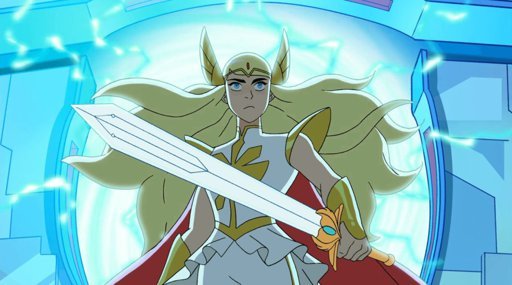
I think what people forget when they type Adora as an extroverted feeling dominant type, is how incredibly personal and tactful Fe-doms are. (On a good day, anyway.) Adora, however, tends to be more impersonal and straight-to-the-point. Te-doms can also come off as people-oriented, that is not exclusive to Fe-doms, but they go about it differently. There is an Fe-dom in the Best Friends Squad, but that is not Adora.
If you think about it, Adora is a very classic Te-Si type. She likes rules and has a natural inclination towards implementing those rules in a very practical, hands-on type of manner. She’s very action oriented. She sees what needs to be done, and does it. ESTJs are highly effective in the sense that they don’t often stop to ask as much questions as some other types. They go about things based on what gets them from point A to point B, and what has worked in the past, or how they are used to doing things. They can also get quite hooked in moving from one plateau to the next in a routinely manner. This can often be how ESTJs go through life, if they don’t stop to think about why they are doing what they are doing, and specifically what personal values drive their actions. No wonder ESTJs are generally the jockiest jocks to ever jock.
Being a Te-dom doesn’t mean you’re not empathetic. Adora definitely is. It just means that you primarily show it through action. If a friend cries, for an Fe-dom the most natural course of action may be to sit with them and listen, and for a Te-dom it might be eliminating the reason for the crying. This is overly simplified of course, and real people as well as good fictional characters are multifaceted, but you get the idea. This is how Adora most often works. It’s not: “Catra, I can see something is bothering you, do you want to talk about it?” It’s: “Let’s take a skiff for a ride to cheer you up.”
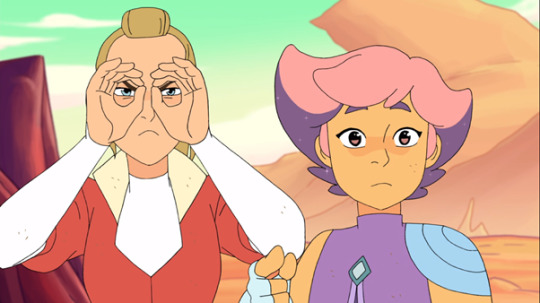
Adora can also be quite funny in a random seeming way, which is due to her tertiary extroverted intuition. ESTJs and ESFJs (tert Ne-types) are often one of the most hilarious people alive, because they like to use their extroverted intuition in tandem with their dominant function. The level of control they have over it isn’t often that great, so it comes off as child-like randomness. Their first two functions lead them towards order and predictability, but when Ne comes into play and they venture out of their usual habits, they may surprise you. The results might be unpredictable: Turns out licking sand didn’t work for Adora but with the help of her friends she managed to play Double Trouble’s game nicely.
In general ESTJs are not in their comfort zone with Ne-type of creativity or innovation but they are not hopeless with it. Adora struggles with the more unpredictable qualities of her sword, like turning it into different objects. She doesn’t use that quality too often and doesn’t have too much variety when she does. While Adora’s first instinct is to simply charge ahead, someone with high Ne would’ve been likely to utilize the flexible qualities of the sword to the max. But Adora can still manage it, her Ne isn’t low enough to be considered her Achille’s heel. She takes a bit of time with it but eventually comes up with solutions that work, such as carrying her sword as a bracelet.
Introverted feeling is what Adora desperately needs in her life and has trouble figuring out. If you think about Fi-doms, they are people who spend a lot of time thinking about who they are, what they want, what they value, and their life builds around that. It’s their most natural state, thinking about whether or not everything they face is something they like/dislike, if it’s good/bad, right/wrong, desirable or not, them or not them.
This is what makes the planets align for an ESTJ. They neglect this function, and when they finally start developing it, the whole world is new for them. This is very literal in Adora’s case, it’s like Etheria’s magic is waking up with her introverted feeling. (Because when all your four functions finally align it IS magic.) That function, introverted feeling, is essentially where she keeps her love for Catra, or rather, it’s the function she needs to be able to make one person, whether it’s Catra or herself, a priority. Te is a rather utilitarian function, and since Adora leads with that and has internalized the belief that her desires don’t matter, there’s nothing in her dominant extroverted thinking process that would justify her “selfish” desires. Te cares about numbers, masses and large scale consequences. She needs Fi, the function that is all about individuality, and essentially yourself. We know how much it takes for that function to surface for her, but when it does, oh boy.

Enneagram
Core type: 9
As a type 9, Adora comes off as unassuming, warm and friendly. 9’s are all about forgiveness, self-neglect and acceptance.
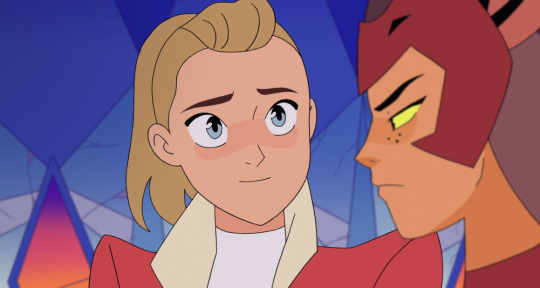
9 is the most “traditionally selfless” type, because unlike Enneagram 2s for example, 9s don’t expect anything in return for what they give to others. Adora’s upbringing has magnified that quality in her (which was obviously very intentional from Shadow Weaver). 9s also have a natural tendency to ignore negative feelings, so they can keep feeling “okay” and unaffected by the external world. This quality makes 9s susceptible to staying in bad situations and bad relationships for a very long time, because they so persistently see the good in others. This is why it took Adora so long, and why she needed evidence that was impossible to ignore to realize that the Horde didn’t have a good cause. 9s are conflict-avoidant because they fear loss and separation above all. That’s why Adora too is such a people pleaser. She would rather live in “fake” harmony, than be the one to create conflict that causes emotional pain. Unfortunately, that’s exactly why 9s sometimes upset others. Like how Adora is unwilling to do anything that would get her on Shadow Weaver’s bad side, which hurts Catra. Or how she pretends to be the She-Ra Plumerians expect her to be so she wouldn’t disappoint them, which only leads her to disappoint them more later. It’s very classic 9 of her to let things develop to a point where everything comes crashing down before addressing the conflict she really needs to address. 9s tend to go with the flow, and sometimes too far.

One of the big things with 9s is that they lack a solid sense of self. They are out of touch with their needs, desires, and identity. Another thing that Shadow Weaver magnified in Adora. Basically, if you break a 9’s sense of self-worth far enough, they’ll become a blank canvas for others to write on, because they already believe they are somehow inherently “less” than others. They always assume to be the least important person in the room. As a 9, what being She-Ra essentially meant to Adora was being everyone else’s servant. For other types it would have meant different things, like to a type 4 it would have been about having personal significance in the world, and to a 3 it would have essentially been about being a celebrity. As a 9 Adora was also one of the most likely people to just roll with it. Like, if you threw something like that at a type 6, they would have most likely just bolted, and half of the storyline would’ve been about “I can’t/don’t want to do this!”. (=a tip for anyone who wants to write certain role swap AUs. ;D)
As a 9, Adora integrates to 3, so at her best mental state, she becomes driven, ambitious, present, and sees her value as a person. She’s no longer someone things happen to, but she’s the driving force in changing her life and the things around her. She disintegrates to 6, so in times of prolonged stress she can get easily irritable, pessimistic, and feel helpless.
Wing: 1

This is where Adora gets her grit, and the moralizing side to her character. Having a strong 1-wing definitely helped her survive in the Horde but it also frequently adds fuel to her self-sacrificing: it’s so easy to back up that 9 quality by telling herself it’s “the right thing to do”. The Right Thing is all 1 cares about. It also plays directly into her dominant Te tendency to follow rules, and makes her the typical “Lawful Good” type of person. Catra’s accusation that Adora “thinks she’s better than everyone” doesn’t miss the mark too far. Even though Adora isn’t a core 1, and as such her whole identity isn’t wrapped up in being morally superior, she does care about having integrity to a certain extend. So, maybe she doesn’t literally think she’s better than everyone, but she still strives to be above certain things, and hates the idea of being “bad”.
Head fix: 5
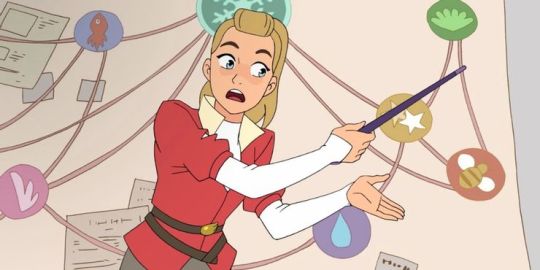
This is largely where Adora’s nerdy side comes from. 5s want to be competent, and they hate not knowing what to do, so they want a lot of information. Not knowing and not understanding frightens them. The most blatant expression of this with Adora is probably the whole thing with the princess prom. This side of her comes to surface when she can’t just adapt (=9) or do the right thing (=1). 5 is also detached and uncomfortable with their feelings, so this only strengthens Adora’s 9-tendency to not address hers. 5s are also big on compartmentalizing, so this greatly helps Adora to entertain certain difficult realities inside herself as if it’s nothing, such as Catra is an enemy she routinely fights, but she would also die for her in a heartbeat.
Heart fix: 3
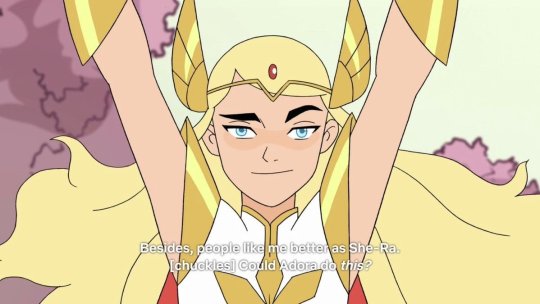
If none of the three other strategies work, Adora will try to solve things and get people on her side by showing off. 3s want to be viewed as valuable and useful by others, and in Adora’s case it’s probably best seen in the way she acts when she meets Huntara. 3 is where she gets her cocky side. It’s a funny contrast with her humble 9-core, and in most cases she only has enough confidence to act like this when she’s with Catra, or when she’s She-Ra. Having a 3-fix also plays into her need to be useful, because while 9s often want to be useful to excuse their existence, 3s also want to hear that they are useful, so whatever little vanity Adora has will always directly reinforce the idea that good things come from her overexerting herself.
Instinctual Variant: so/sp
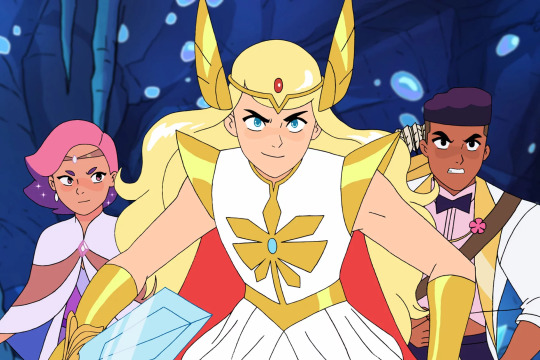
Social instinct is Adora’s primary instinct. She has a natural inclination to play by the rules of the group and acknowledge hierarchy, because social variants get safety from belonging and having a place, a role, in something bigger than themselves. Even though she has her hero complex, she doesn’t tend to fly solo until the stakes are really high. She never questions the Princess Alliance, it’s simply natural for her to move from one group to another, and that She-Ra’s strength belongs for the rebellion. She doesn’t really seem to get why some other people don’t seek the strength in numbers. Losing She-Ra also primarily means losing her place in the group for her, and she very much struggles to accept this.
Self-preservation instinct is Adora’s secondary one. It may seem like it isn’t because she’s so ready to die for others, but self-preservation isn’t really about that. It’s more about being preoccupied with questions of resources. Like, after turning against the Horde, Adora isn’t just concerned about losing the support of the group, her mind also immediately goes to “I don’t have a roof over my head”. She’s not as particular about having her physical needs met as a primary self-pres would be, but it’s included in her priorities. She feels out of place in Bright Moon because she’s used to different kind of surroundings, and losing She-Ra’s power is a hard blow because of losing the physical strength she has as She-Ra: her means for providing physical safety for others. She also desires some amount of independence, and She-Ra gave her that as well.
Sexual instinct is what Adora needs more in her life. That’s so tied to the whole point of the show that I’m not even sure what would be worthwhile for me to say about it at this point. The whole conflict between her and Catra relates so closely to it. Adora will routinely make sacrifices in her personal relationships for the common good, because one-to-one relationships are not her first concern in life. People who neglect their sexual instinct are uncomfortable with their more “primal” and intense feelings, so even in her closest relationships Adora is more about being friendly and accommodating and showing warm feelings to the other. She doesn’t have the “let me stare you deep into the eyes for hours and drown myself in them” quality that is characteristic of the sexual instinct. However, this is exactly the part she needs to accept in herself to be fully satisfied and to take her relationships to another level.

SPOP is so juicy because it’s so much about personal growth. We see Adora face pretty much every weakness and blind spot that relates to her personality, and we get to see her change for the better. At least that makes it very satisfying for me to analyse, because I’m such a fan of growth. Can’t wait to get to analyse the other main characters, and the supporting cast too.
Also, if you wish I would do a particular character, just tell me and I’ll take that into consideration!
25 notes
·
View notes
Text
Helping Young Girls Find Their Voice While Developing Friendships
Katie Hurley’s office is filled with young girls who struggle with courage, confidence and friendship skills. Hurley, a child and adolescent psychotherapist and author of the recently published “No More Mean Girls,” has noticed an escalating trend: Girls right now are overwhelmed with adult-directed activities.
“Girls no longer have time to partake in girlhood on their own,” said Hurley.
This overly structured, overly controlled milieu leaves girls feeling anxious and uncertain about their abilities to navigate basic social challenges.
“Friendship is a process. It takes time and practice,” said Hurley. “Girls need time to work through friendship issues — to experience conflict, negotiate and get through the natural bumps in the road. But we have them so highly scheduled that they are not using organic friendship-making skills anymore.”
When girls do have limited, adult-free time with one another, said Hurley, she’s not surprised that it’s often fraught with exclusion, triangulation, fighting or avoidance. The solution to these challenges is not more adult intervention, but rather more encouragement and opportunities for girls to tackle these problems on their own. “Our need to have all the solutions as parents is very high right now,” said Hurley, and that is backfiring.
Listen and Ask Questions
When Hurley asks her patients what they want from their parents, the response is almost always the same: “Listen and ask questions.”
“As parents, we are not great listeners,” said Hurley, “We are very busy, constantly trying to multitask. And we are often disconnected from kids because we are connected digitally.”
When kids come to us with a problem, we tend to bounce between extremes — either dismissing their concerns as “no big deal” or jumping in to solve their problems for them. Both take less time than the alternative: guiding and supporting them as they solve their own problems.
“They need to know that it’s totally acceptable and normal to struggle at times,” said Hurley, “and we want them to come to us with their concerns. But we need to remember that parenting is about guidance, not controlling.”
In the height of emotion — often immediately after school ends when they are tired and hungry — girls sometimes “go into survival mode and use language at home that is more traumatic than what is really happening at school.” If parents match that level of emotion, they can intensify the situation.
For example, says Hurley, if your child shares an unkind comment she heard on the playground, don’t respond with, “ ‘That kid is mean — stay away from her!’ That ends a friendship potential and doesn’t give your daughter room to work it out.” Instead, stay calm, gather information, and respond empathetically, using phrases such as, “This sounds hard. Can you tell me more about it?” or “Sounds like you had a rotten day. I understand. I have had those days, too.”
“Once they have vented and are not so tense inside their bodies, then you can start to brainstorm together,” said Hurley. Revisit the problem when they are calm and rested, allowing them to stay in the driver’s seat. For instance, if the struggle is whom to play with at recess, encourage them to “zoom out” and reflect on the big picture, perhaps drawing a map of the playground. Where does she go? What does she like to do? What activities do other kids do at recess? What’s one thing she wants to try tomorrow?
Practice Bravery
When girls think up a strategy they want to try — such as asking a new person to play and joining a new activity at recess — they also need to muster the courage to test it out. And that isn’t always easy.
“I have girls in my office who are petrified of taking risks,” said Hurley. “Perfectionism is on the rise, fear of failure is on the rise. Girls are socialized to be pleasers. That is a mistake. Girls should be socialized to be brave.”
It starts with our language. When young girls start climbing on the playground, do the adults reflexively say, “Be careful”? As parents, said Hurley, we can deliberately communicate the message, “We take risks to practice being brave.” For some girls, risks might look like climbing a tree and, for others, it might look like saying hello to someone new. Free time in nature, on the playground, on unstructured playdates, and with open-ended play materials provides an organic classroom for girls to strengthen their courage muscles and test their ideas.
They “need the time and space to try and fail again and fail again and fail again,” said Hurley. “When we step in and solve their problems for them, what we really communicate is, ‘I’m afraid you can’t do it well enough, so I’m going to do it for you.’ and that starts fear of failure.’ Step back, let them make choices.”
Teach Assertive Communication
Part of courage is finding one’s “brave voice,” said Hurley. Girls often confuse assertive communication with aggressive communication and then default to the other extreme: passivity. Assertive communication — including making eye contact, speaking in a clear, calm voice, and listening patiently to others — communicates self-respect and respect for the other person.
Families can make a game out of teaching assertive communication skills, said Hurley. “Host little presidential debates in your home. Run for ��Queen of the Kitchen.’ Make a speech. Have a family debate night.” When your child really wants something, ask them to write a speech and give you her best persuasive argument.
Practice yields dividends. “When girls get in the habit of being assertive, it feels good,” said Hurley. “They feel like people want to listen to them. They say, ‘My teacher is calling on me more. My friends are listening to ideas.’ They feel more self-confident. And when one girl stands up and is more assertive, others start to do that as well.”
Model Resilience
“One of the best gifts parents can give their kids is the gift of their failures,” said Hurley. Tell your children stories about times you’ve tried and failed and bounced back. Our stories shape children’s understanding of how the world works. According to one study, children who hear stories about how family members and ancestors overcame obstacles are more resilient in the face of challenges.
These stories can serve as an important reminder to parents as well: We became stronger by facing challenges and overcoming them. We learned by doing — and so will our kids. “As parents, we cannot micromanage everything,” said Hurley. “They’ve got to learn how to have these conversations with friends. We can give them language and we can role-play, but let girls do things on their own. They are capable, and they have really good ideas.”
Helping Young Girls Find Their Voice While Developing Friendships published first on https://greatpricecourse.tumblr.com/
0 notes
Text
Helping Young Girls Find Their Voice While Developing Friendships
Katie Hurley’s office is filled with young girls who struggle with courage, confidence and friendship skills. Hurley, a child and adolescent psychotherapist and author of the recently published “No More Mean Girls,” has noticed an escalating trend: Girls right now are overwhelmed with adult-directed activities.
“Girls no longer have time to partake in girlhood on their own,” said Hurley.
This overly structured, overly controlled milieu leaves girls feeling anxious and uncertain about their abilities to navigate basic social challenges.
“Friendship is a process. It takes time and practice,” said Hurley. “Girls need time to work through friendship issues — to experience conflict, negotiate and get through the natural bumps in the road. But we have them so highly scheduled that they are not using organic friendship-making skills anymore.”
When girls do have limited, adult-free time with one another, said Hurley, she’s not surprised that it’s often fraught with exclusion, triangulation, fighting or avoidance. The solution to these challenges is not more adult intervention, but rather more encouragement and opportunities for girls to tackle these problems on their own. “Our need to have all the solutions as parents is very high right now,” said Hurley, and that is backfiring.
Listen and Ask Questions
When Hurley asks her patients what they want from their parents, the response is almost always the same: “Listen and ask questions.”
“As parents, we are not great listeners,” said Hurley, “We are very busy, constantly trying to multitask. And we are often disconnected from kids because we are connected digitally.”
When kids come to us with a problem, we tend to bounce between extremes — either dismissing their concerns as “no big deal” or jumping in to solve their problems for them. Both take less time than the alternative: guiding and supporting them as they solve their own problems.
“They need to know that it’s totally acceptable and normal to struggle at times,” said Hurley, “and we want them to come to us with their concerns. But we need to remember that parenting is about guidance, not controlling.”
In the height of emotion — often immediately after school ends when they are tired and hungry — girls sometimes “go into survival mode and use language at home that is more traumatic than what is really happening at school.” If parents match that level of emotion, they can intensify the situation.
For example, says Hurley, if your child shares an unkind comment she heard on the playground, don’t respond with, “ ‘That kid is mean — stay away from her!’ That ends a friendship potential and doesn’t give your daughter room to work it out.” Instead, stay calm, gather information, and respond empathetically, using phrases such as, “This sounds hard. Can you tell me more about it?” or “Sounds like you had a rotten day. I understand. I have had those days, too.”
“Once they have vented and are not so tense inside their bodies, then you can start to brainstorm together,” said Hurley. Revisit the problem when they are calm and rested, allowing them to stay in the driver’s seat. For instance, if the struggle is whom to play with at recess, encourage them to “zoom out” and reflect on the big picture, perhaps drawing a map of the playground. Where does she go? What does she like to do? What activities do other kids do at recess? What’s one thing she wants to try tomorrow?
Practice Bravery
When girls think up a strategy they want to try — such as asking a new person to play and joining a new activity at recess — they also need to muster the courage to test it out. And that isn’t always easy.
“I have girls in my office who are petrified of taking risks,” said Hurley. “Perfectionism is on the rise, fear of failure is on the rise. Girls are socialized to be pleasers. That is a mistake. Girls should be socialized to be brave.”
It starts with our language. When young girls start climbing on the playground, do the adults reflexively say, “Be careful”? As parents, said Hurley, we can deliberately communicate the message, “We take risks to practice being brave.” For some girls, risks might look like climbing a tree and, for others, it might look like saying hello to someone new. Free time in nature, on the playground, on unstructured playdates, and with open-ended play materials provides an organic classroom for girls to strengthen their courage muscles and test their ideas.
They “need the time and space to try and fail again and fail again and fail again,” said Hurley. “When we step in and solve their problems for them, what we really communicate is, ‘I’m afraid you can’t do it well enough, so I’m going to do it for you.’ and that starts fear of failure.’ Step back, let them make choices.”
Teach Assertive Communication
Part of courage is finding one’s “brave voice,” said Hurley. Girls often confuse assertive communication with aggressive communication and then default to the other extreme: passivity. Assertive communication — including making eye contact, speaking in a clear, calm voice, and listening patiently to others — communicates self-respect and respect for the other person.
Families can make a game out of teaching assertive communication skills, said Hurley. “Host little presidential debates in your home. Run for ‘Queen of the Kitchen.’ Make a speech. Have a family debate night.” When your child really wants something, ask them to write a speech and give you her best persuasive argument.
Practice yields dividends. “When girls get in the habit of being assertive, it feels good,” said Hurley. “They feel like people want to listen to them. They say, ‘My teacher is calling on me more. My friends are listening to ideas.’ They feel more self-confident. And when one girl stands up and is more assertive, others start to do that as well.”
Model Resilience
“One of the best gifts parents can give their kids is the gift of their failures,” said Hurley. Tell your children stories about times you’ve tried and failed and bounced back. Our stories shape children’s understanding of how the world works. According to one study, children who hear stories about how family members and ancestors overcame obstacles are more resilient in the face of challenges.
These stories can serve as an important reminder to parents as well: We became stronger by facing challenges and overcoming them. We learned by doing — and so will our kids. “As parents, we cannot micromanage everything,” said Hurley. “They’ve got to learn how to have these conversations with friends. We can give them language and we can role-play, but let girls do things on their own. They are capable, and they have really good ideas.”
Helping Young Girls Find Their Voice While Developing Friendships published first on https://dlbusinessnow.tumblr.com/
0 notes